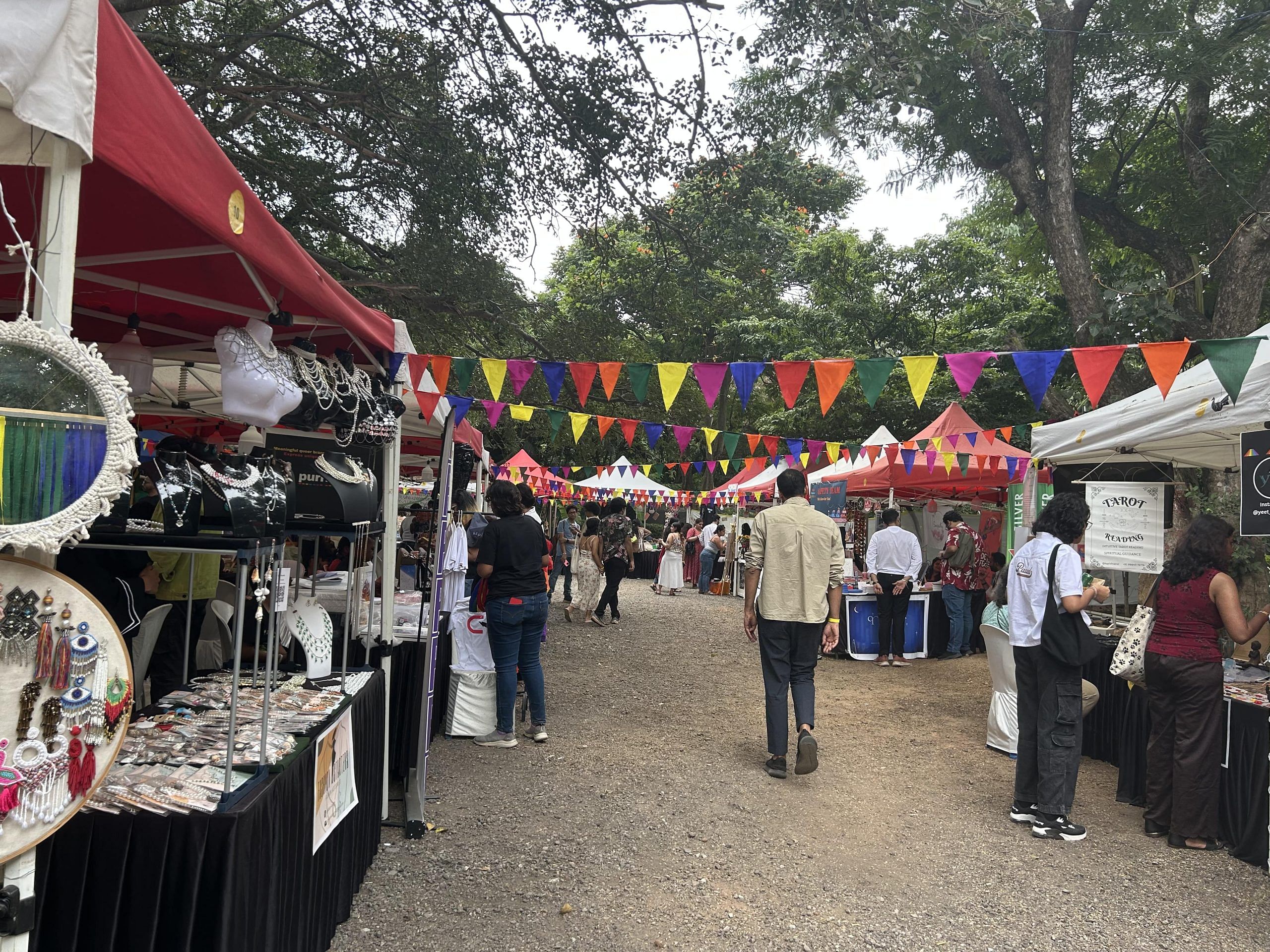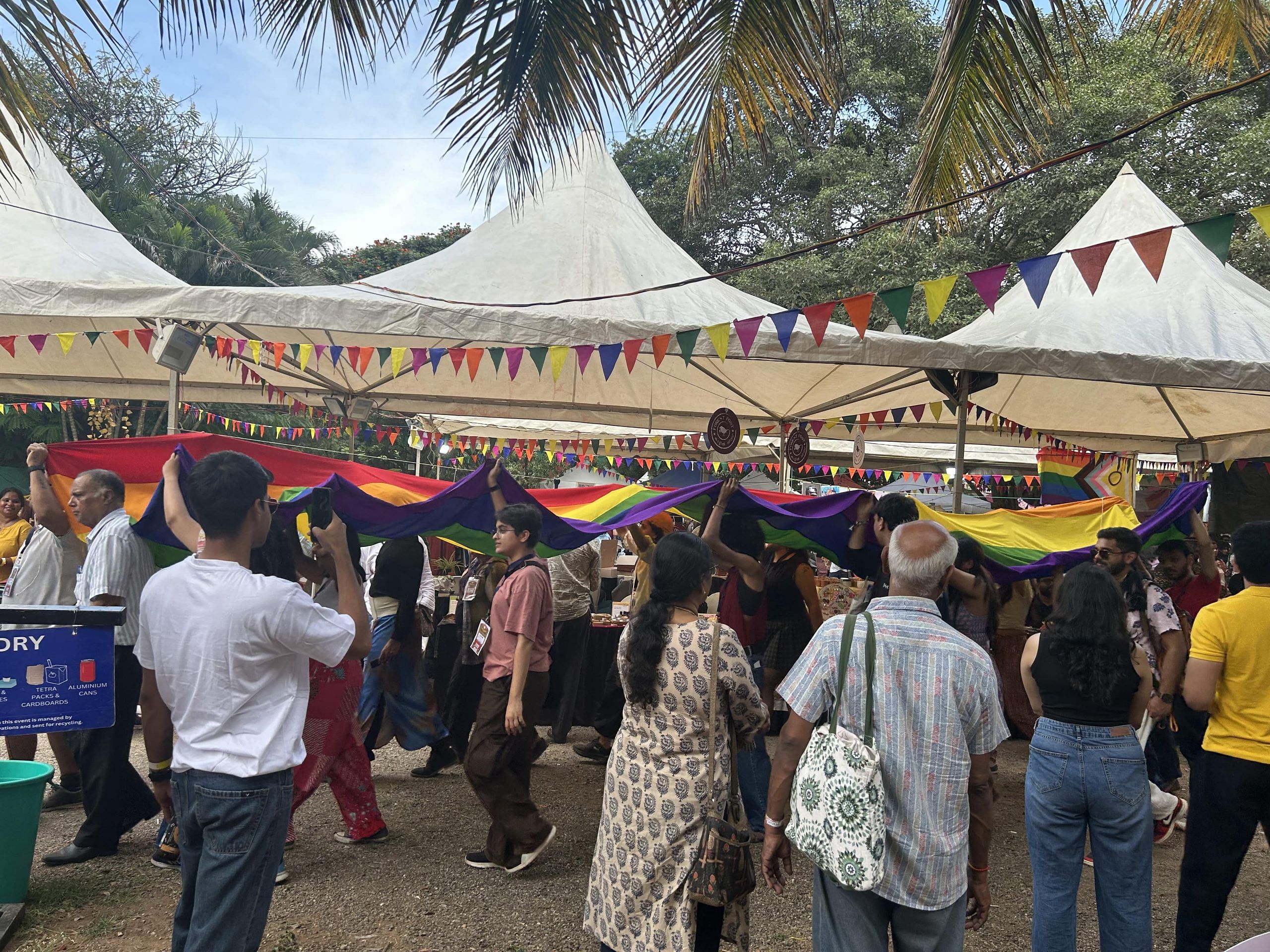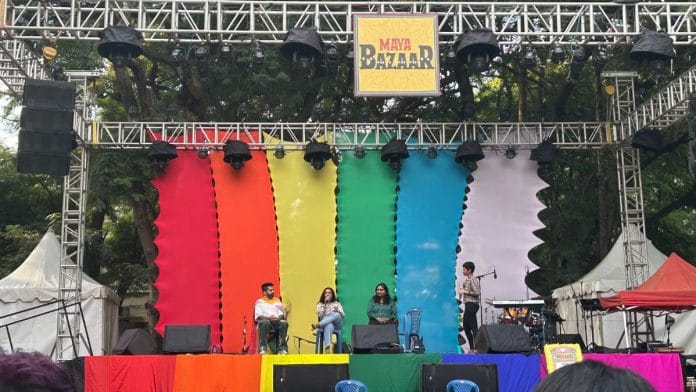Bengaluru: Bisexual artist ‘Voldydrawsalot’ shed her mask of heterosexuality for the first time at Maya Bazaar. One of India’s largest queer festivals, the event held in Bengaluru last weekend offered a safe space for the LGBTQIA+ community to celebrate their pride with their loved ones.
“Seeing other people from the community [at the event] made me want to be more visible,” said the artist.
With Lady Gaga’s Born This Way blaring in the background, the festival’s fifth edition kicked off with pride flags and panel discussions at Bengaluru’s Jayamahal Palace grounds on 28-29 September.
Over 150 stalls set up by queer, women, and ‘ally’ entrepreneurs sold everything from clothes to food, as the festival offered people a chance to browse through gender–fluid products, pride-themed office and home decor, and art by queer artists.

Voldydrawsalot’s artwork focused on queer identity, mental health, gender, and emotions.
“As a bisexual woman who can pass off as a straight person very easily, I always hesitated to be present and seen in queer spaces because my queerness has not felt enough to me to take up space in a culture as rich as this. This [festival] was liberating,” she said.
Maya Bazaar was started by the queer feminist platform Road to Utopia, which collaborates with Google, Intuit, IndiGo, and CallHub. Beyond the festival, it aims to carry forward inclusive business practices in corporate India. It is a partnership that goes beyond financial sponsorship.
Since its inception in 2021, the queer festival has opened its gates to non-LGBTQIA+ persons with disabilities (PwD) and Dalit, Bahujan, and Adivasi (DBA) communities for the first time this year.
For queer community members like Kusuma Krishna, a staff business operations programme manager at Intuit who identifies as a lesbian woman, it’s a step in the right direction.
“It was a constant effort to hide myself and my true identity at my workplace. I have seen companies conduct one-time events for the community but they are purely tokenistic in nature. We need the needle to move toward real inclusivity,” she said.

Corporate hesitation
The role of India Inc in queer awareness and rights was the focus of many panel discussions conducted over the weekend as part of the festival.
Corporate India has been reluctant to initiate such conversations, said Swetha Harikrishnan, a member of the LGBTQIA+ community and moderator of a panel discussion titled ‘Pride Meets Purpose: Corporate Conversations That Drive Change’.
“While some corporations like PhonePe are recognising the diversity and merit of queer persons by hiring them for important positions solely based on their talent, most companies are still extremely shy when it comes to addressing inclusivity issues,” Harikrishnan said during the discussion with Krishna.
Other panellists included Tina Vinod, founder and CEO of Diversity Simplified and Ashish Chopra, who identifies as a gay man and is a recruiter at Google in Bengaluru.
According to Krishna, corporate India was largely conspicuous by its absence from the debate as the Supreme Court deliberated on a group of petitions seeking to legalise same-sex marriages in the country.
“Even after the judgment, companies did not address the issue at hand or assure its employees from the LGBTQIA+ community of existing benefits they can avail. It comes from a place where the companies do not want to attract notice,” she said.
As the program manager in her company, Krishna worked with other employees to draft a statement after the verdict.
“Not many dared to do this.”
Also read: WhatsApp is like a yogic concept of Maya. New book inspires many names
US elections, pinkwashing
The conversation then quickly moved to the upcoming elections in the United States. Panellists feared the trickle-down effect that the outcome is likely to have on international companies in India.
“If Trump wins, the impact could be felt within not just schools but on practices of US-based corporations in India that are currently on the path to becoming gender-inclusive,” said Chopra.
He recalled some uncomfortable experiences with potential job managers during interviews.
“They would ask me why I coloured my hair green, why I had piercings and would urge me to get rid of it if I were to join their company,” he said. This was also the time Chopra was finding out more about his identity. “It was a mix of confusion, shame, and curiosity—and such experiences forced me to hide my true self.”
However, working at Google India gave him hope. “I see members of the community being hired for senior positions. My interviewer also put me in touch with the Employee Resource Group (ERG) team leader, who was also from the queer community, to make sure I felt safe,” Chopra added.
Meanwhile, the panellists cautioned against “pinkwashing” practices prevalent within top corporations in the city.
“Most companies will use Pride Month to pretend that they are allies by organising marches, photo sessions, and turning their online profile pictures to rainbow flags,” said Vinod. Change must happen at every level.
Several audience members spoke about issues with access to housing. “We struggle to find affordable and safe accommodation within the city. House owners look down upon queer couples wanting to live together. Corporates should help us out with this,” an audience member said. Agreeing, panellists too opened up about prejudice among landlords.
“When my partner and I were searching for accommodation, the owners would make problematic statements. They would be willing to give the house for rent only if we declared we were bachelors [single],” Krishna recalled.
Panellists urged companies to conduct an initiative like Maya Bazaar within office premises.
“I wish my confused teenage self had access to spaces like Maya Bazaar. Today, everyone within this bazaar is more like a close-knit family to me than my own biological family,” Chopra said.
(Edited by Prasanna Bachchhav)






